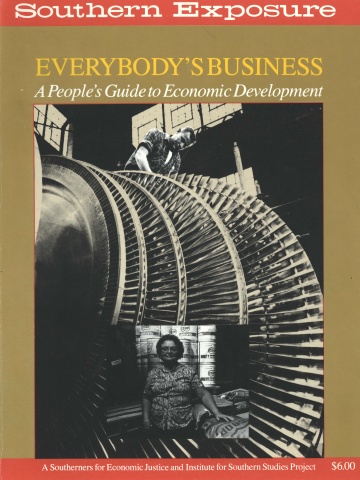
This article originally appeared in Southern Exposure Vol. 14 No. 5/6, "Everybody's Business." Find more from that issue here.
Looking at the economy from the perspective of people who are consistently left out produces different guidelines for development than those followed by policymakers seeking growth. Even progressives committed to the right of all people to a decent, safe job may lose sight of key ingredients in a successful strategy that fits the needs and conditions of the contemporary South.
Affirmative Action. The goal of growth and full employment benefits all people, but in practice history shows that even in the best of times people of color and women remain disproportionately unemployed and underemployed. Issues of affirmative action and equality, therefore, cannot take a back seat to issues of economic growth. While changes in the economy influence racial and sexual inequity, they are not the cause of discrimination, nor are they the solution.
We must acknowledge that we live in a racist and sexist society, in a society that chooses to allocate its resources in large measure on the basis of color, culture, and gender. A new electronics factory will likely fill the assembly-line jobs with women and the high-paying technical jobs with men, generally whites. The same type of job segregation would normally occur in a new bank, textile plant, fast-food restaurant, or construction site.
Given these conditions, no strategy for economy development or economic democracy can succeed that merely adopts growth in jobs as its objective. It must first insist upon a comprehensive, enforced system of affirmative action in employment, promotions, and pay for all employees.
Job Quality. Positive economic planning must focus on the quality of work. Quality work provides safety from hazards and disease, is socially as well as economically productive, offers opportunities for personal growth and development, provides an adequate family income, and affords the worker the dignity of exercising some significant measure of control over his or her work.
Most jobs being created today don't come close to meeting these criteria. We're constantly being told, "I'll take what I can get" or "Things are so bad, any old job will do." But as long as we accept the notion that "any old job will do," then that's all that will be available.
In fact, without increasing the focus on better jobs, the quality of work will decline. The economy acts to reinforce the power of capital to define work in its interests. Recessions and unemployment function as a disciplinary process to create fear and desperation, to diminish expectations and worker demands, and to make the false security of reactionary ideologies attractive. We must continue to insist on a higher standard of quality jobs.
Democratic Control. Economic development strategies must include the principle of democratic control as an essential factor in the creation and management of jobs. We have been told that rational economic decision-making can only be done by a select few: those who own capital and who, through some magic (because they own it), automatically know what to do with it. The kicker is that supposedly their decisions ultimately serve all our best interests, even though we don't have anything to say about them.
But there are no benevolent dictators. To the extent that we have successfully reduced discrimination, pollution, unsafe work, and other harmful conditions, it is because we have mobilized through the democratic process of organizations, unions, community groups, and some political institutions to bring about laws and other forces which express our desires for a just and decent society.
We have learned that critical decisions about the economy cannot be left to rational profiteers. Significant controls — democratically created controls — must be placed on economic decisions so that those who are alleged to benefit from these decisions do in fact benefit. It is imperative that community groups, churches, unions, and other public-minded organizations educate themselves and their members about the economy and how to best shape economic policy.
Political Strategy. Economic planning and development requires a political strategy. Most industrial planning focuses on the operations of large corporations. As major employers and controllers of capital, private companies are rightly the target of many indigenous struggles for community and workplace justice. But such corporations will not provide jobs to most of the structurally unemployed.
The needs of women, people of color, and the unemployed must be met by large-scale public works programs and an expanding number of nonprofit community enterprises (cooperatives, publicly owned firms, worker-owned businesses, etc.) Public jobs and capital for such enterprises both depend on controlling the resources of city, county, and state governments.
The struggle for political power at the local level is therefore directly related to the goal of economic democracy. Ultimately, little significant change in the character of U.S. economic policy will occur without attaining political power — power to develop the massive resources that exist and that are essential for the kind of community-based development which serves the economic needs of all people.
Tags
Howard Stanback
Howard Stanback, a native of North Carolina and prominent political economist, is deputy director for the Mayor's Office of Employment and Training in Chicago. (1986)

